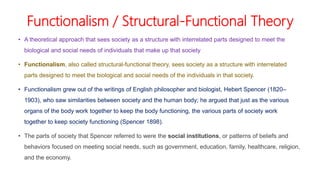Functionalism and conflict theory are two of the major theoretical perspectives in sociology, and they offer different explanations for the way society functions. These theories are not necessarily mutually exclusive, and many sociologists incorporate elements of both into their work. In this essay, we will explore the key concepts of functionalism and conflict theory and examine the ways in which these theories differ.
Functionalism is a sociological perspective that emphasizes the way that the various parts of society work together to maintain stability and continuity. According to functionalists, society is a complex system made up of various institutions and social structures, such as the economy, politics, education, and the family. These institutions and structures perform specific functions that contribute to the smooth functioning of society as a whole. For example, the economy provides the resources necessary for the survival and well-being of individuals, while the education system helps to transmit cultural values and prepare individuals for their roles in society.
One of the key principles of functionalism is the idea of social equilibrium, which refers to the balance and stability that exists within a society. According to functionalists, when all of the parts of society are functioning properly, the society will be in a state of equilibrium. If one part of the system is not functioning properly, it can create tension or conflict within the society. However, functionalists believe that society has mechanisms in place to restore equilibrium, such as social norms and values, which help to regulate behavior and prevent conflicts from escalating.
Conflict theory, on the other hand, focuses on the ways in which power and inequality shape society. According to conflict theorists, society is not a harmonious system, but rather is characterized by ongoing struggles for power and resources. Conflict theorists argue that the distribution of power and resources within a society is not equal, and that the dominant groups in society use their power to maintain their privileged position. This can take many forms, such as laws, policies, and cultural norms that benefit the dominant groups at the expense of marginalized groups.
Conflict theorists believe that social change is the result of conflicts and struggles between different groups in society. They argue that social change is not the result of a harmonious process of social evolution, but rather is the result of the efforts of marginalized groups to challenge and change the existing power dynamics. Conflict theorists also view social institutions, such as the economy and the government, as being tools that the dominant groups use to maintain their power and control over society.
In conclusion, functionalism and conflict theory are two major theoretical perspectives in sociology that offer different explanations for the way society functions. Functionalism emphasizes the way that the various parts of society work together to maintain stability and continuity, while conflict theory focuses on the ways in which power and inequality shape society. While these theories have some differences, they can also be complementary and can be used together to gain a more nuanced understanding of the complex social world.






